Taxation Law: UK Australia Double Tax Agreement & Income Assessment
VerifiedAdded on 2023/06/12
|11
|2894
|60
Report
AI Summary
This report provides a detailed analysis of various aspects of taxation law, focusing primarily on the UK Australia Double Tax Agreement and its implications for permanent establishments and business profits. It examines the definition of 'permanent establishment' under the agreement and how the business profits of a UK-incorporated enterprise are taxed in Australia. The report further discusses whether contracts made through an independent agent would result in a permanent establishment. Additionally, the document assesses the tax liabilities of an MLB prospect playing in Australia, considering income earned and property rentals. It also delves into the concept of income from one-off sale transactions and allowable deductions for business expenses, including interest on loans. Finally, the report explores the 50% CGT discount rule and its application to capital gains, offering insights into its benefits and implications for taxpayers. This document is available on Desklib, a platform providing a wide range of academic resources for students.
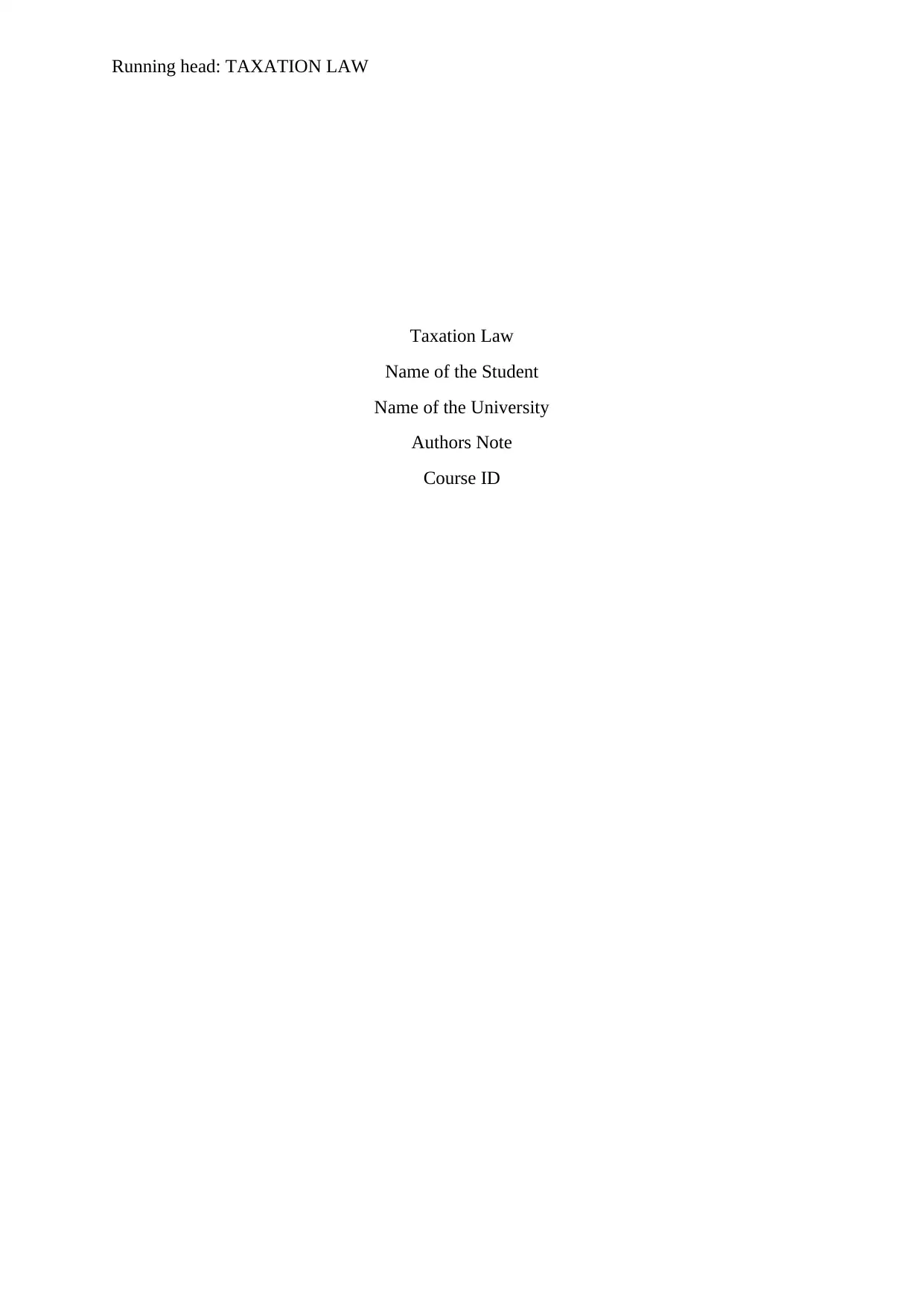
Running head: TAXATION LAW
Taxation Law
Name of the Student
Name of the University
Authors Note
Course ID
Taxation Law
Name of the Student
Name of the University
Authors Note
Course ID
Paraphrase This Document
Need a fresh take? Get an instant paraphrase of this document with our AI Paraphraser
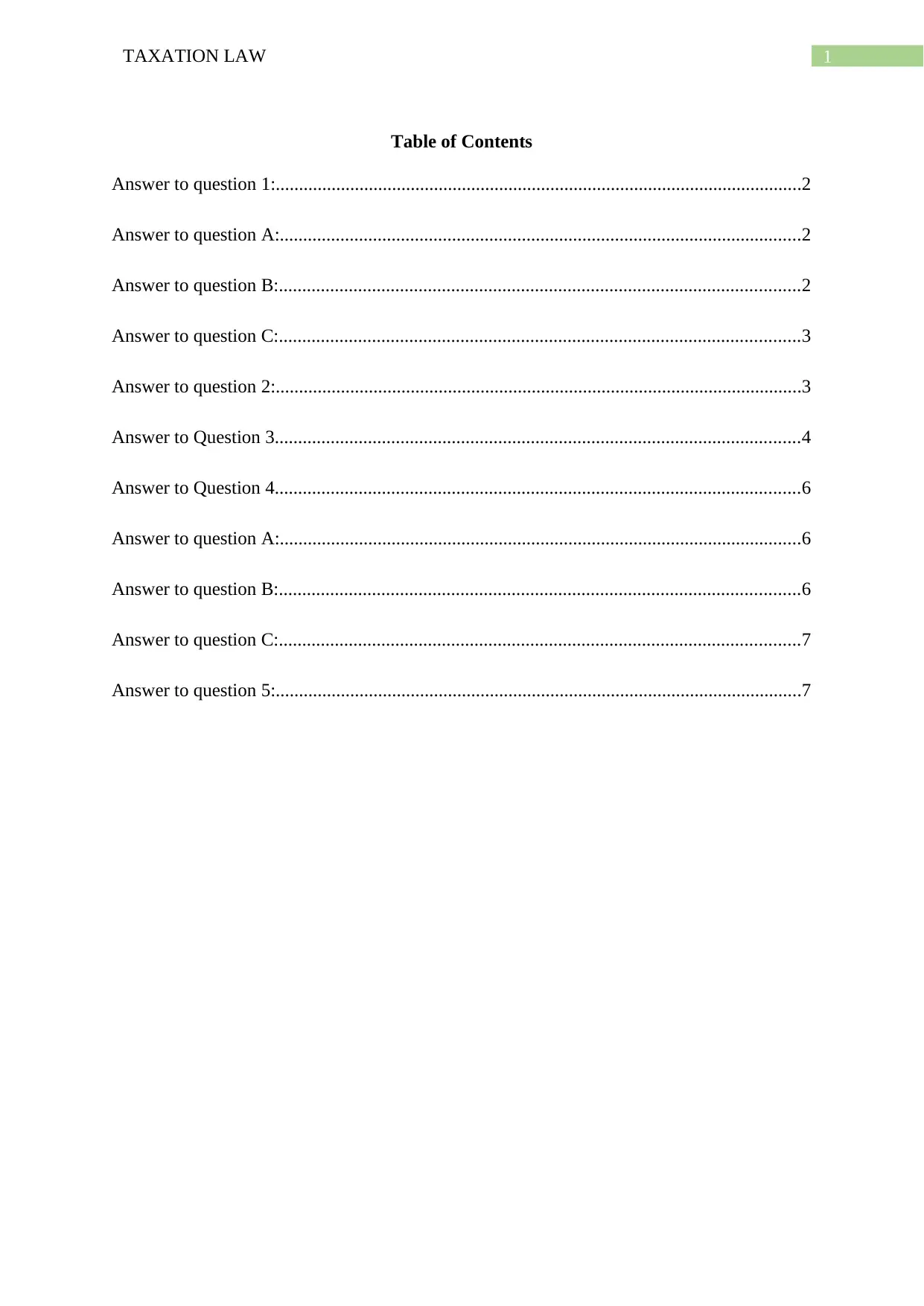
1TAXATION LAW
Table of Contents
Answer to question 1:.................................................................................................................2
Answer to question A:................................................................................................................2
Answer to question B:................................................................................................................2
Answer to question C:................................................................................................................3
Answer to question 2:.................................................................................................................3
Answer to Question 3.................................................................................................................4
Answer to Question 4.................................................................................................................6
Answer to question A:................................................................................................................6
Answer to question B:................................................................................................................6
Answer to question C:................................................................................................................7
Answer to question 5:.................................................................................................................7
Table of Contents
Answer to question 1:.................................................................................................................2
Answer to question A:................................................................................................................2
Answer to question B:................................................................................................................2
Answer to question C:................................................................................................................3
Answer to question 2:.................................................................................................................3
Answer to Question 3.................................................................................................................4
Answer to Question 4.................................................................................................................6
Answer to question A:................................................................................................................6
Answer to question B:................................................................................................................6
Answer to question C:................................................................................................................7
Answer to question 5:.................................................................................................................7
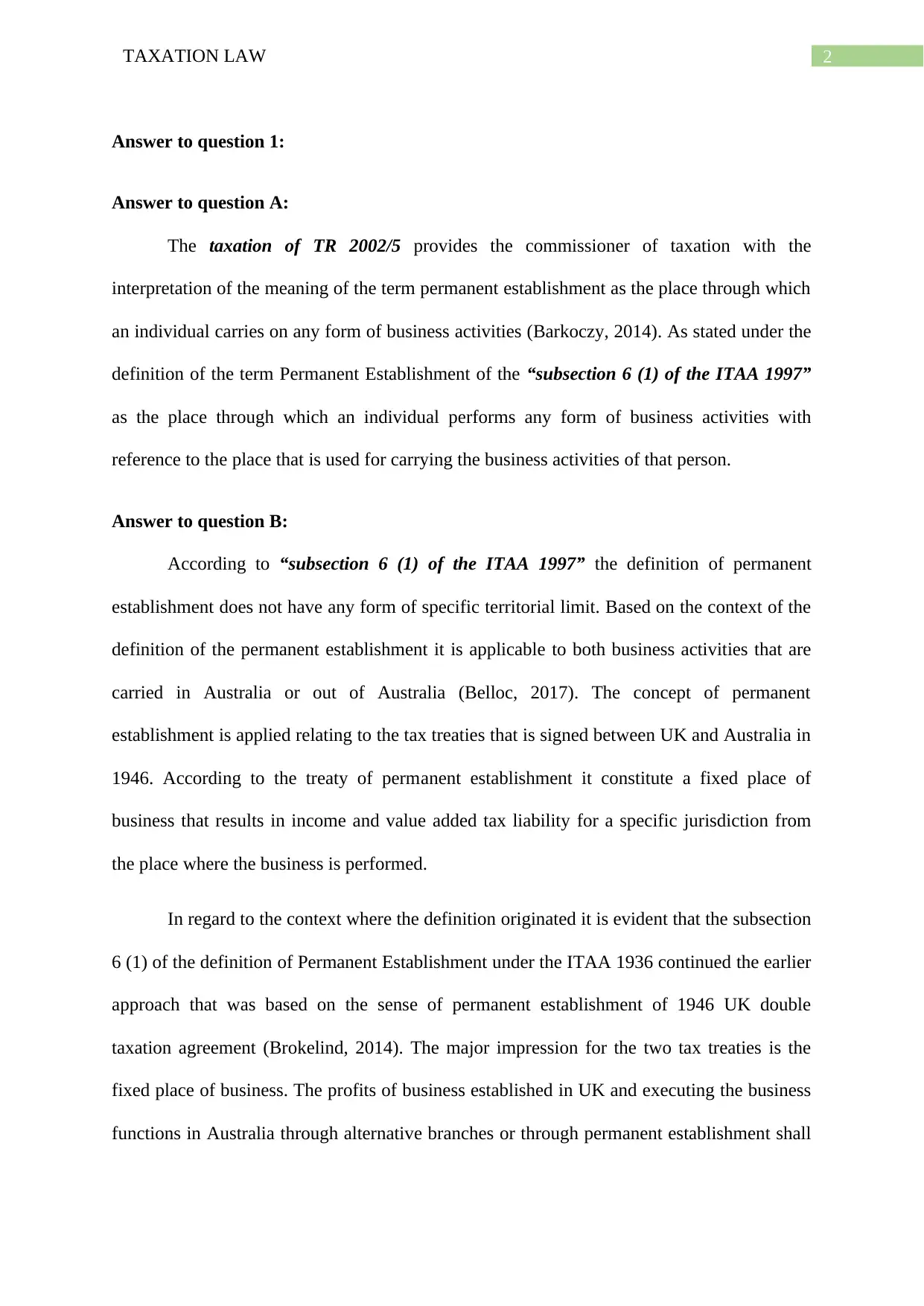
2TAXATION LAW
Answer to question 1:
Answer to question A:
The taxation of TR 2002/5 provides the commissioner of taxation with the
interpretation of the meaning of the term permanent establishment as the place through which
an individual carries on any form of business activities (Barkoczy, 2014). As stated under the
definition of the term Permanent Establishment of the “subsection 6 (1) of the ITAA 1997”
as the place through which an individual performs any form of business activities with
reference to the place that is used for carrying the business activities of that person.
Answer to question B:
According to “subsection 6 (1) of the ITAA 1997” the definition of permanent
establishment does not have any form of specific territorial limit. Based on the context of the
definition of the permanent establishment it is applicable to both business activities that are
carried in Australia or out of Australia (Belloc, 2017). The concept of permanent
establishment is applied relating to the tax treaties that is signed between UK and Australia in
1946. According to the treaty of permanent establishment it constitute a fixed place of
business that results in income and value added tax liability for a specific jurisdiction from
the place where the business is performed.
In regard to the context where the definition originated it is evident that the subsection
6 (1) of the definition of Permanent Establishment under the ITAA 1936 continued the earlier
approach that was based on the sense of permanent establishment of 1946 UK double
taxation agreement (Brokelind, 2014). The major impression for the two tax treaties is the
fixed place of business. The profits of business established in UK and executing the business
functions in Australia through alternative branches or through permanent establishment shall
Answer to question 1:
Answer to question A:
The taxation of TR 2002/5 provides the commissioner of taxation with the
interpretation of the meaning of the term permanent establishment as the place through which
an individual carries on any form of business activities (Barkoczy, 2014). As stated under the
definition of the term Permanent Establishment of the “subsection 6 (1) of the ITAA 1997”
as the place through which an individual performs any form of business activities with
reference to the place that is used for carrying the business activities of that person.
Answer to question B:
According to “subsection 6 (1) of the ITAA 1997” the definition of permanent
establishment does not have any form of specific territorial limit. Based on the context of the
definition of the permanent establishment it is applicable to both business activities that are
carried in Australia or out of Australia (Belloc, 2017). The concept of permanent
establishment is applied relating to the tax treaties that is signed between UK and Australia in
1946. According to the treaty of permanent establishment it constitute a fixed place of
business that results in income and value added tax liability for a specific jurisdiction from
the place where the business is performed.
In regard to the context where the definition originated it is evident that the subsection
6 (1) of the definition of Permanent Establishment under the ITAA 1936 continued the earlier
approach that was based on the sense of permanent establishment of 1946 UK double
taxation agreement (Brokelind, 2014). The major impression for the two tax treaties is the
fixed place of business. The profits of business established in UK and executing the business
functions in Australia through alternative branches or through permanent establishment shall
⊘ This is a preview!⊘
Do you want full access?
Subscribe today to unlock all pages.

Trusted by 1+ million students worldwide
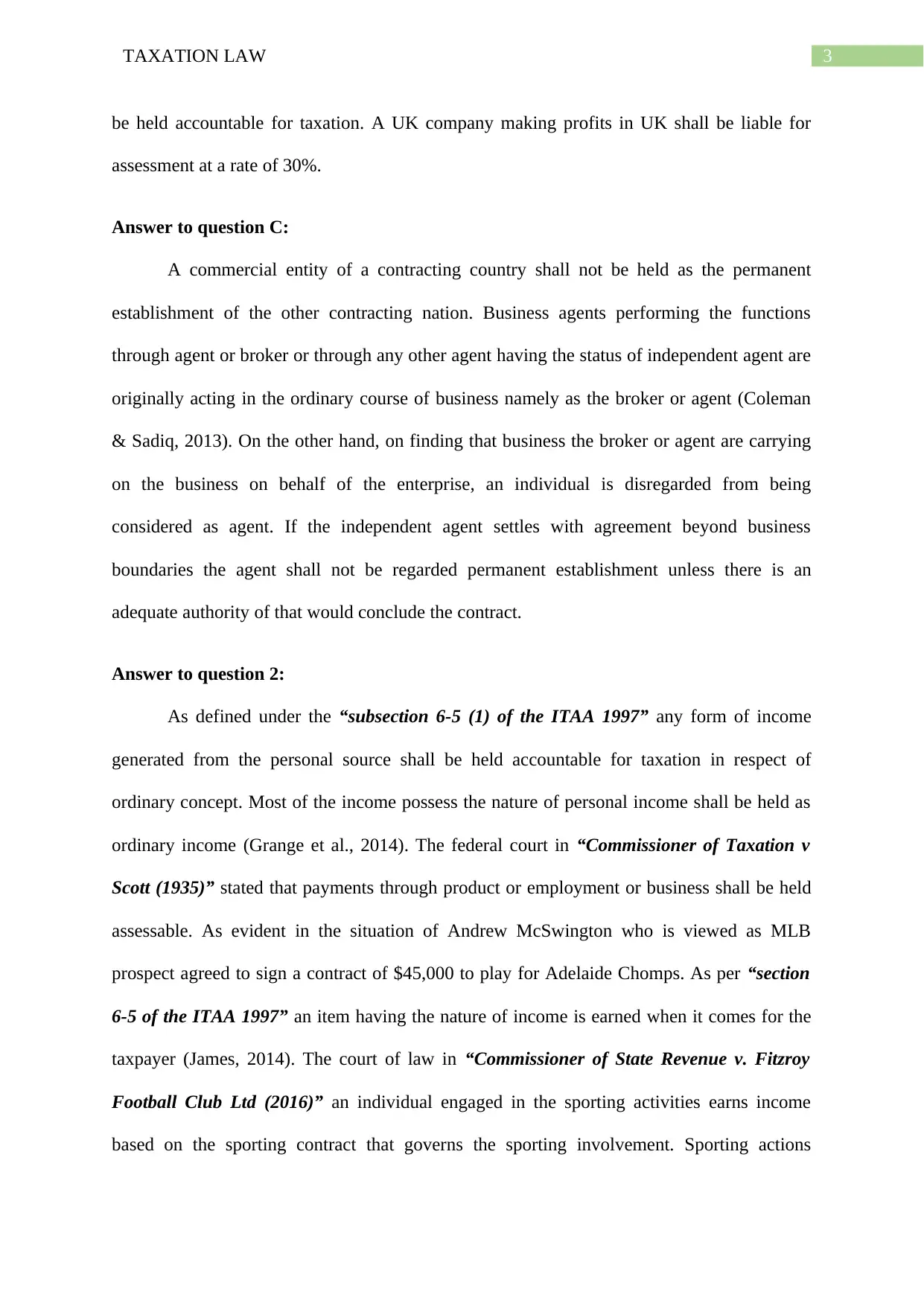
3TAXATION LAW
be held accountable for taxation. A UK company making profits in UK shall be liable for
assessment at a rate of 30%.
Answer to question C:
A commercial entity of a contracting country shall not be held as the permanent
establishment of the other contracting nation. Business agents performing the functions
through agent or broker or through any other agent having the status of independent agent are
originally acting in the ordinary course of business namely as the broker or agent (Coleman
& Sadiq, 2013). On the other hand, on finding that business the broker or agent are carrying
on the business on behalf of the enterprise, an individual is disregarded from being
considered as agent. If the independent agent settles with agreement beyond business
boundaries the agent shall not be regarded permanent establishment unless there is an
adequate authority of that would conclude the contract.
Answer to question 2:
As defined under the “subsection 6-5 (1) of the ITAA 1997” any form of income
generated from the personal source shall be held accountable for taxation in respect of
ordinary concept. Most of the income possess the nature of personal income shall be held as
ordinary income (Grange et al., 2014). The federal court in “Commissioner of Taxation v
Scott (1935)” stated that payments through product or employment or business shall be held
assessable. As evident in the situation of Andrew McSwington who is viewed as MLB
prospect agreed to sign a contract of $45,000 to play for Adelaide Chomps. As per “section
6-5 of the ITAA 1997” an item having the nature of income is earned when it comes for the
taxpayer (James, 2014). The court of law in “Commissioner of State Revenue v. Fitzroy
Football Club Ltd (2016)” an individual engaged in the sporting activities earns income
based on the sporting contract that governs the sporting involvement. Sporting actions
be held accountable for taxation. A UK company making profits in UK shall be liable for
assessment at a rate of 30%.
Answer to question C:
A commercial entity of a contracting country shall not be held as the permanent
establishment of the other contracting nation. Business agents performing the functions
through agent or broker or through any other agent having the status of independent agent are
originally acting in the ordinary course of business namely as the broker or agent (Coleman
& Sadiq, 2013). On the other hand, on finding that business the broker or agent are carrying
on the business on behalf of the enterprise, an individual is disregarded from being
considered as agent. If the independent agent settles with agreement beyond business
boundaries the agent shall not be regarded permanent establishment unless there is an
adequate authority of that would conclude the contract.
Answer to question 2:
As defined under the “subsection 6-5 (1) of the ITAA 1997” any form of income
generated from the personal source shall be held accountable for taxation in respect of
ordinary concept. Most of the income possess the nature of personal income shall be held as
ordinary income (Grange et al., 2014). The federal court in “Commissioner of Taxation v
Scott (1935)” stated that payments through product or employment or business shall be held
assessable. As evident in the situation of Andrew McSwington who is viewed as MLB
prospect agreed to sign a contract of $45,000 to play for Adelaide Chomps. As per “section
6-5 of the ITAA 1997” an item having the nature of income is earned when it comes for the
taxpayer (James, 2014). The court of law in “Commissioner of State Revenue v. Fitzroy
Football Club Ltd (2016)” an individual engaged in the sporting activities earns income
based on the sporting contract that governs the sporting involvement. Sporting actions
Paraphrase This Document
Need a fresh take? Get an instant paraphrase of this document with our AI Paraphraser
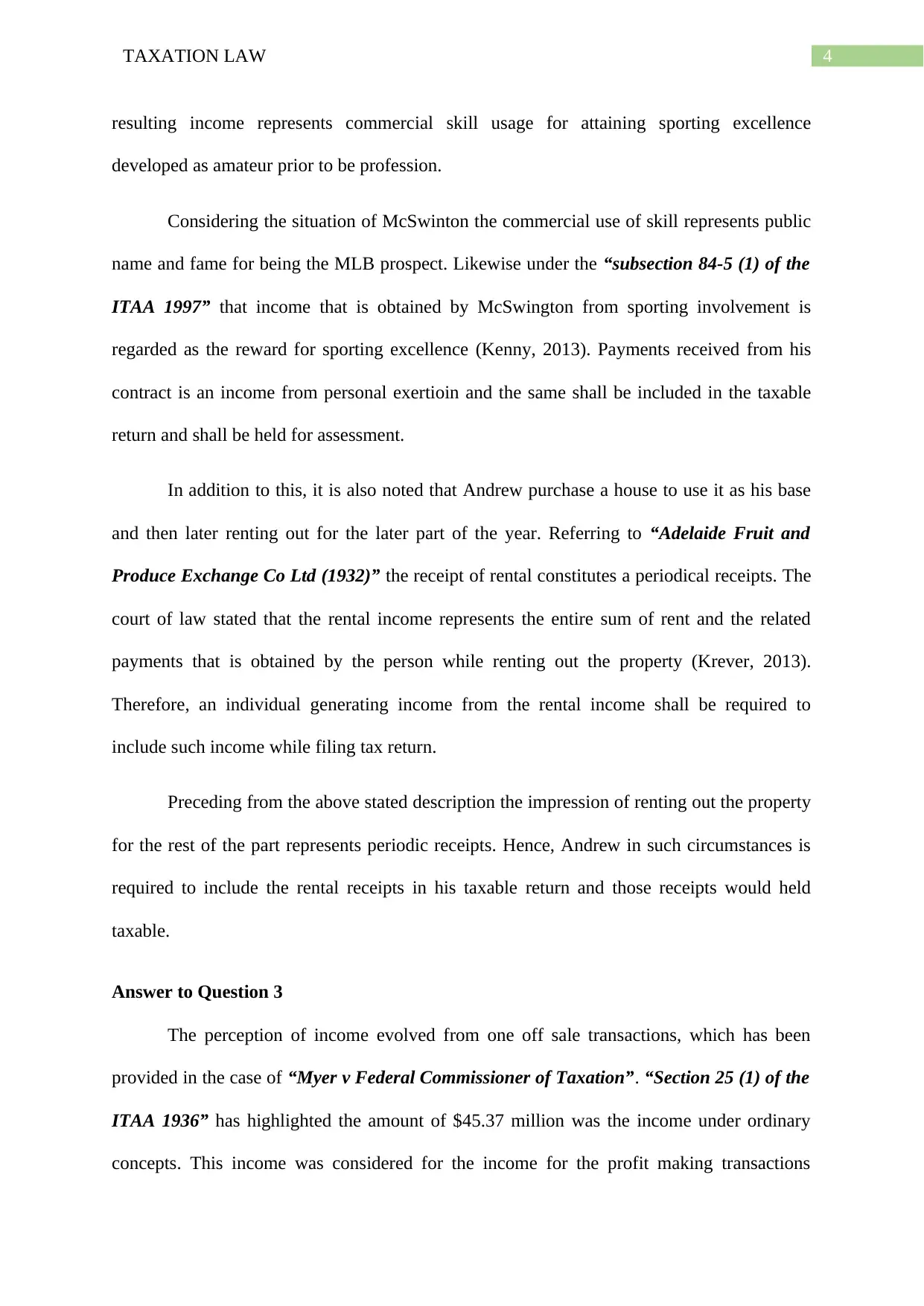
4TAXATION LAW
resulting income represents commercial skill usage for attaining sporting excellence
developed as amateur prior to be profession.
Considering the situation of McSwinton the commercial use of skill represents public
name and fame for being the MLB prospect. Likewise under the “subsection 84-5 (1) of the
ITAA 1997” that income that is obtained by McSwington from sporting involvement is
regarded as the reward for sporting excellence (Kenny, 2013). Payments received from his
contract is an income from personal exertioin and the same shall be included in the taxable
return and shall be held for assessment.
In addition to this, it is also noted that Andrew purchase a house to use it as his base
and then later renting out for the later part of the year. Referring to “Adelaide Fruit and
Produce Exchange Co Ltd (1932)” the receipt of rental constitutes a periodical receipts. The
court of law stated that the rental income represents the entire sum of rent and the related
payments that is obtained by the person while renting out the property (Krever, 2013).
Therefore, an individual generating income from the rental income shall be required to
include such income while filing tax return.
Preceding from the above stated description the impression of renting out the property
for the rest of the part represents periodic receipts. Hence, Andrew in such circumstances is
required to include the rental receipts in his taxable return and those receipts would held
taxable.
Answer to Question 3
The perception of income evolved from one off sale transactions, which has been
provided in the case of “Myer v Federal Commissioner of Taxation”. “Section 25 (1) of the
ITAA 1936” has highlighted the amount of $45.37 million was the income under ordinary
concepts. This income was considered for the income for the profit making transactions
resulting income represents commercial skill usage for attaining sporting excellence
developed as amateur prior to be profession.
Considering the situation of McSwinton the commercial use of skill represents public
name and fame for being the MLB prospect. Likewise under the “subsection 84-5 (1) of the
ITAA 1997” that income that is obtained by McSwington from sporting involvement is
regarded as the reward for sporting excellence (Kenny, 2013). Payments received from his
contract is an income from personal exertioin and the same shall be included in the taxable
return and shall be held for assessment.
In addition to this, it is also noted that Andrew purchase a house to use it as his base
and then later renting out for the later part of the year. Referring to “Adelaide Fruit and
Produce Exchange Co Ltd (1932)” the receipt of rental constitutes a periodical receipts. The
court of law stated that the rental income represents the entire sum of rent and the related
payments that is obtained by the person while renting out the property (Krever, 2013).
Therefore, an individual generating income from the rental income shall be required to
include such income while filing tax return.
Preceding from the above stated description the impression of renting out the property
for the rest of the part represents periodic receipts. Hence, Andrew in such circumstances is
required to include the rental receipts in his taxable return and those receipts would held
taxable.
Answer to Question 3
The perception of income evolved from one off sale transactions, which has been
provided in the case of “Myer v Federal Commissioner of Taxation”. “Section 25 (1) of the
ITAA 1936” has highlighted the amount of $45.37 million was the income under ordinary
concepts. This income was considered for the income for the profit making transactions
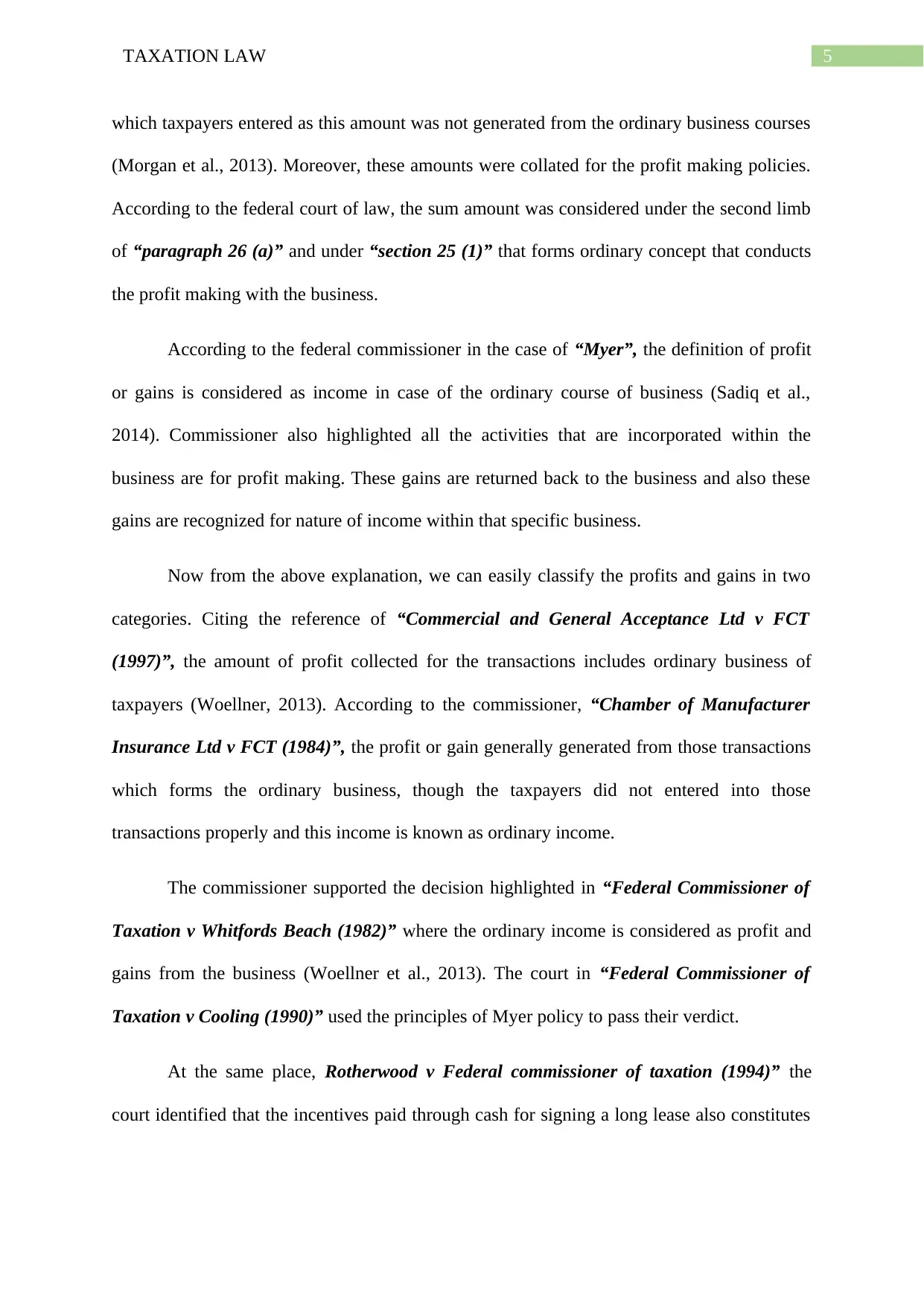
5TAXATION LAW
which taxpayers entered as this amount was not generated from the ordinary business courses
(Morgan et al., 2013). Moreover, these amounts were collated for the profit making policies.
According to the federal court of law, the sum amount was considered under the second limb
of “paragraph 26 (a)” and under “section 25 (1)” that forms ordinary concept that conducts
the profit making with the business.
According to the federal commissioner in the case of “Myer”, the definition of profit
or gains is considered as income in case of the ordinary course of business (Sadiq et al.,
2014). Commissioner also highlighted all the activities that are incorporated within the
business are for profit making. These gains are returned back to the business and also these
gains are recognized for nature of income within that specific business.
Now from the above explanation, we can easily classify the profits and gains in two
categories. Citing the reference of “Commercial and General Acceptance Ltd v FCT
(1997)”, the amount of profit collected for the transactions includes ordinary business of
taxpayers (Woellner, 2013). According to the commissioner, “Chamber of Manufacturer
Insurance Ltd v FCT (1984)”, the profit or gain generally generated from those transactions
which forms the ordinary business, though the taxpayers did not entered into those
transactions properly and this income is known as ordinary income.
The commissioner supported the decision highlighted in “Federal Commissioner of
Taxation v Whitfords Beach (1982)” where the ordinary income is considered as profit and
gains from the business (Woellner et al., 2013). The court in “Federal Commissioner of
Taxation v Cooling (1990)” used the principles of Myer policy to pass their verdict.
At the same place, Rotherwood v Federal commissioner of taxation (1994)” the
court identified that the incentives paid through cash for signing a long lease also constitutes
which taxpayers entered as this amount was not generated from the ordinary business courses
(Morgan et al., 2013). Moreover, these amounts were collated for the profit making policies.
According to the federal court of law, the sum amount was considered under the second limb
of “paragraph 26 (a)” and under “section 25 (1)” that forms ordinary concept that conducts
the profit making with the business.
According to the federal commissioner in the case of “Myer”, the definition of profit
or gains is considered as income in case of the ordinary course of business (Sadiq et al.,
2014). Commissioner also highlighted all the activities that are incorporated within the
business are for profit making. These gains are returned back to the business and also these
gains are recognized for nature of income within that specific business.
Now from the above explanation, we can easily classify the profits and gains in two
categories. Citing the reference of “Commercial and General Acceptance Ltd v FCT
(1997)”, the amount of profit collected for the transactions includes ordinary business of
taxpayers (Woellner, 2013). According to the commissioner, “Chamber of Manufacturer
Insurance Ltd v FCT (1984)”, the profit or gain generally generated from those transactions
which forms the ordinary business, though the taxpayers did not entered into those
transactions properly and this income is known as ordinary income.
The commissioner supported the decision highlighted in “Federal Commissioner of
Taxation v Whitfords Beach (1982)” where the ordinary income is considered as profit and
gains from the business (Woellner et al., 2013). The court in “Federal Commissioner of
Taxation v Cooling (1990)” used the principles of Myer policy to pass their verdict.
At the same place, Rotherwood v Federal commissioner of taxation (1994)” the
court identified that the incentives paid through cash for signing a long lease also constitutes
⊘ This is a preview!⊘
Do you want full access?
Subscribe today to unlock all pages.

Trusted by 1+ million students worldwide
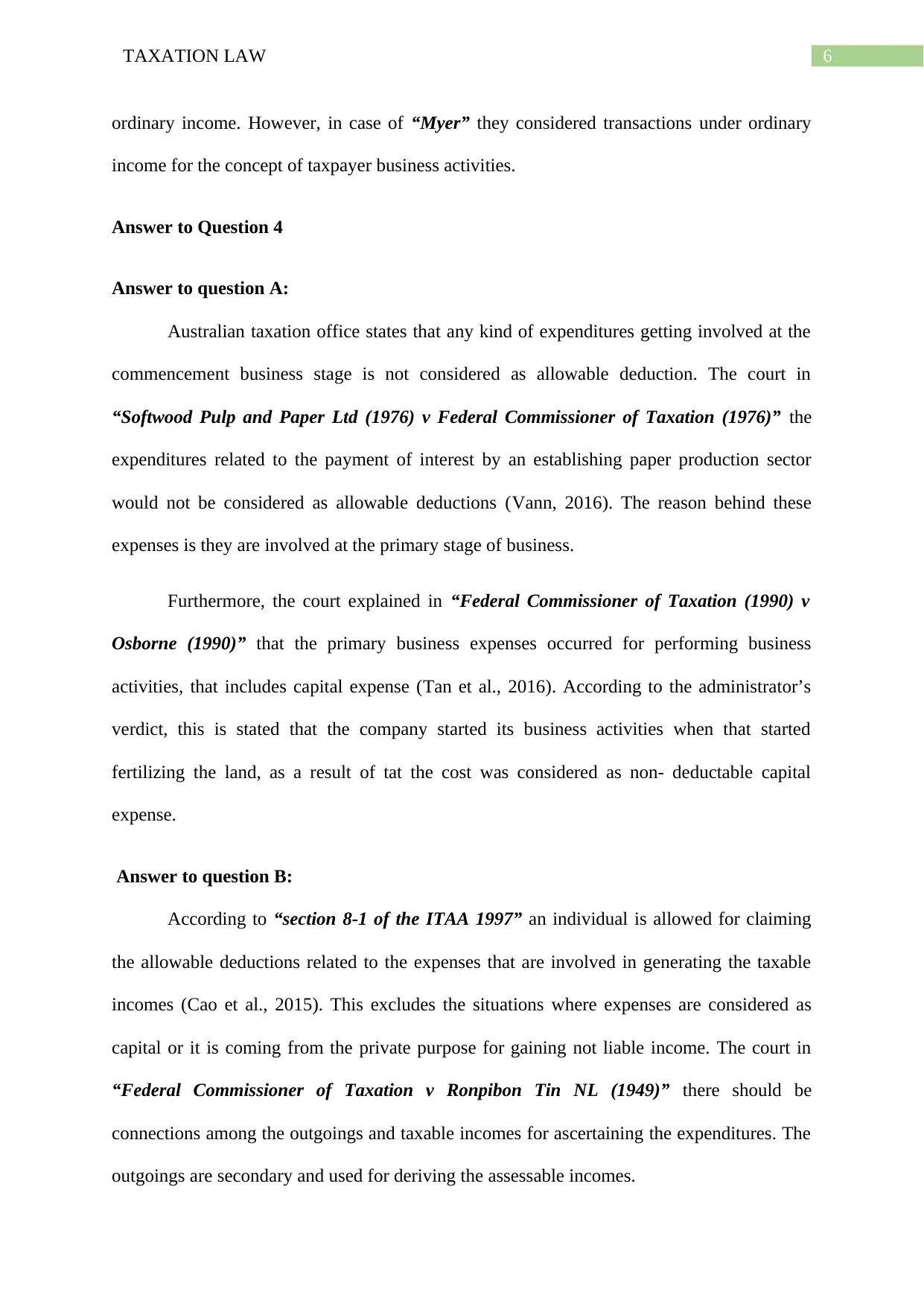
6TAXATION LAW
ordinary income. However, in case of “Myer” they considered transactions under ordinary
income for the concept of taxpayer business activities.
Answer to Question 4
Answer to question A:
Australian taxation office states that any kind of expenditures getting involved at the
commencement business stage is not considered as allowable deduction. The court in
“Softwood Pulp and Paper Ltd (1976) v Federal Commissioner of Taxation (1976)” the
expenditures related to the payment of interest by an establishing paper production sector
would not be considered as allowable deductions (Vann, 2016). The reason behind these
expenses is they are involved at the primary stage of business.
Furthermore, the court explained in “Federal Commissioner of Taxation (1990) v
Osborne (1990)” that the primary business expenses occurred for performing business
activities, that includes capital expense (Tan et al., 2016). According to the administrator’s
verdict, this is stated that the company started its business activities when that started
fertilizing the land, as a result of tat the cost was considered as non- deductable capital
expense.
Answer to question B:
According to “section 8-1 of the ITAA 1997” an individual is allowed for claiming
the allowable deductions related to the expenses that are involved in generating the taxable
incomes (Cao et al., 2015). This excludes the situations where expenses are considered as
capital or it is coming from the private purpose for gaining not liable income. The court in
“Federal Commissioner of Taxation v Ronpibon Tin NL (1949)” there should be
connections among the outgoings and taxable incomes for ascertaining the expenditures. The
outgoings are secondary and used for deriving the assessable incomes.
ordinary income. However, in case of “Myer” they considered transactions under ordinary
income for the concept of taxpayer business activities.
Answer to Question 4
Answer to question A:
Australian taxation office states that any kind of expenditures getting involved at the
commencement business stage is not considered as allowable deduction. The court in
“Softwood Pulp and Paper Ltd (1976) v Federal Commissioner of Taxation (1976)” the
expenditures related to the payment of interest by an establishing paper production sector
would not be considered as allowable deductions (Vann, 2016). The reason behind these
expenses is they are involved at the primary stage of business.
Furthermore, the court explained in “Federal Commissioner of Taxation (1990) v
Osborne (1990)” that the primary business expenses occurred for performing business
activities, that includes capital expense (Tan et al., 2016). According to the administrator’s
verdict, this is stated that the company started its business activities when that started
fertilizing the land, as a result of tat the cost was considered as non- deductable capital
expense.
Answer to question B:
According to “section 8-1 of the ITAA 1997” an individual is allowed for claiming
the allowable deductions related to the expenses that are involved in generating the taxable
incomes (Cao et al., 2015). This excludes the situations where expenses are considered as
capital or it is coming from the private purpose for gaining not liable income. The court in
“Federal Commissioner of Taxation v Ronpibon Tin NL (1949)” there should be
connections among the outgoings and taxable incomes for ascertaining the expenditures. The
outgoings are secondary and used for deriving the assessable incomes.
Paraphrase This Document
Need a fresh take? Get an instant paraphrase of this document with our AI Paraphraser
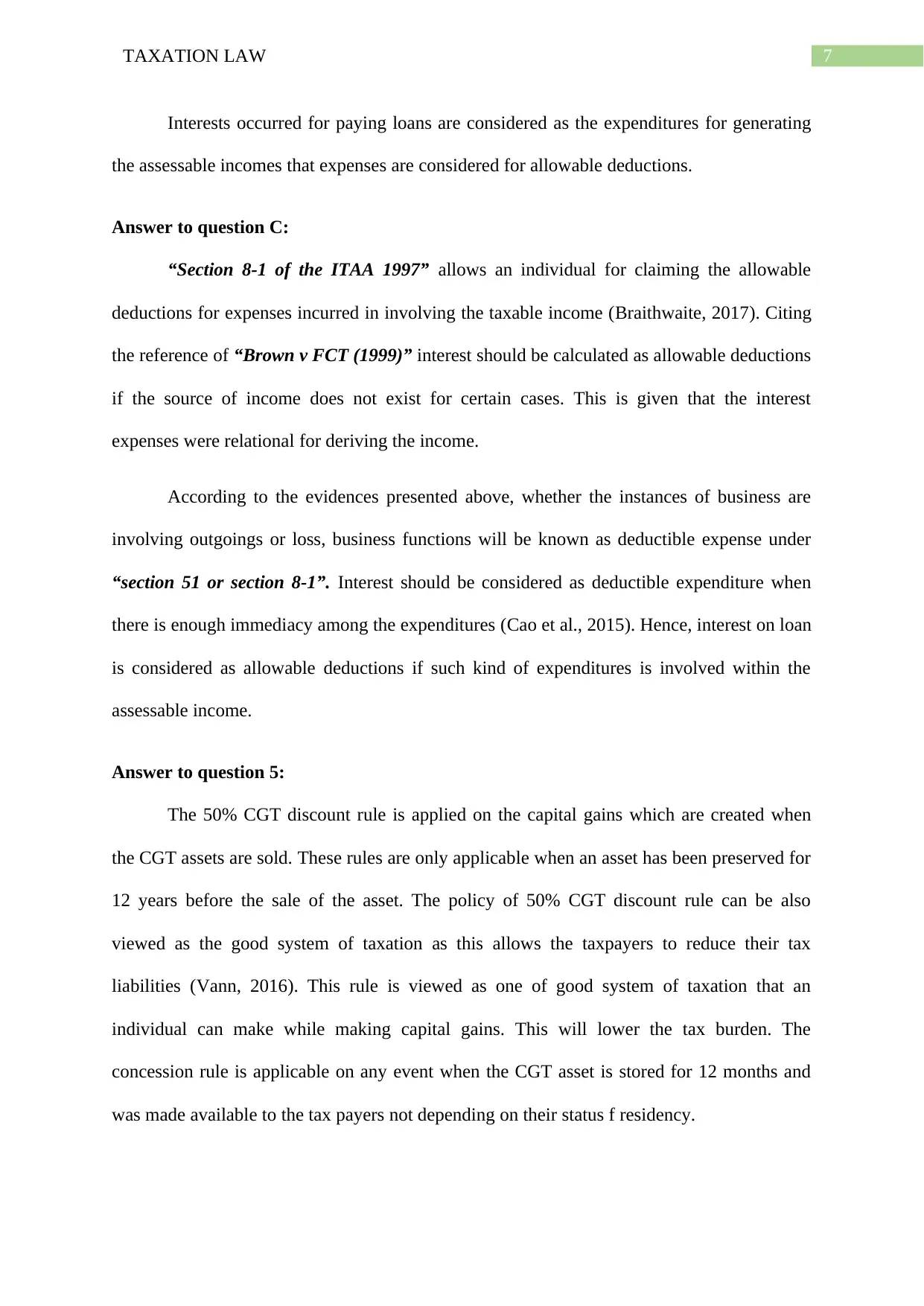
7TAXATION LAW
Interests occurred for paying loans are considered as the expenditures for generating
the assessable incomes that expenses are considered for allowable deductions.
Answer to question C:
“Section 8-1 of the ITAA 1997” allows an individual for claiming the allowable
deductions for expenses incurred in involving the taxable income (Braithwaite, 2017). Citing
the reference of “Brown v FCT (1999)” interest should be calculated as allowable deductions
if the source of income does not exist for certain cases. This is given that the interest
expenses were relational for deriving the income.
According to the evidences presented above, whether the instances of business are
involving outgoings or loss, business functions will be known as deductible expense under
“section 51 or section 8-1”. Interest should be considered as deductible expenditure when
there is enough immediacy among the expenditures (Cao et al., 2015). Hence, interest on loan
is considered as allowable deductions if such kind of expenditures is involved within the
assessable income.
Answer to question 5:
The 50% CGT discount rule is applied on the capital gains which are created when
the CGT assets are sold. These rules are only applicable when an asset has been preserved for
12 years before the sale of the asset. The policy of 50% CGT discount rule can be also
viewed as the good system of taxation as this allows the taxpayers to reduce their tax
liabilities (Vann, 2016). This rule is viewed as one of good system of taxation that an
individual can make while making capital gains. This will lower the tax burden. The
concession rule is applicable on any event when the CGT asset is stored for 12 months and
was made available to the tax payers not depending on their status f residency.
Interests occurred for paying loans are considered as the expenditures for generating
the assessable incomes that expenses are considered for allowable deductions.
Answer to question C:
“Section 8-1 of the ITAA 1997” allows an individual for claiming the allowable
deductions for expenses incurred in involving the taxable income (Braithwaite, 2017). Citing
the reference of “Brown v FCT (1999)” interest should be calculated as allowable deductions
if the source of income does not exist for certain cases. This is given that the interest
expenses were relational for deriving the income.
According to the evidences presented above, whether the instances of business are
involving outgoings or loss, business functions will be known as deductible expense under
“section 51 or section 8-1”. Interest should be considered as deductible expenditure when
there is enough immediacy among the expenditures (Cao et al., 2015). Hence, interest on loan
is considered as allowable deductions if such kind of expenditures is involved within the
assessable income.
Answer to question 5:
The 50% CGT discount rule is applied on the capital gains which are created when
the CGT assets are sold. These rules are only applicable when an asset has been preserved for
12 years before the sale of the asset. The policy of 50% CGT discount rule can be also
viewed as the good system of taxation as this allows the taxpayers to reduce their tax
liabilities (Vann, 2016). This rule is viewed as one of good system of taxation that an
individual can make while making capital gains. This will lower the tax burden. The
concession rule is applicable on any event when the CGT asset is stored for 12 months and
was made available to the tax payers not depending on their status f residency.
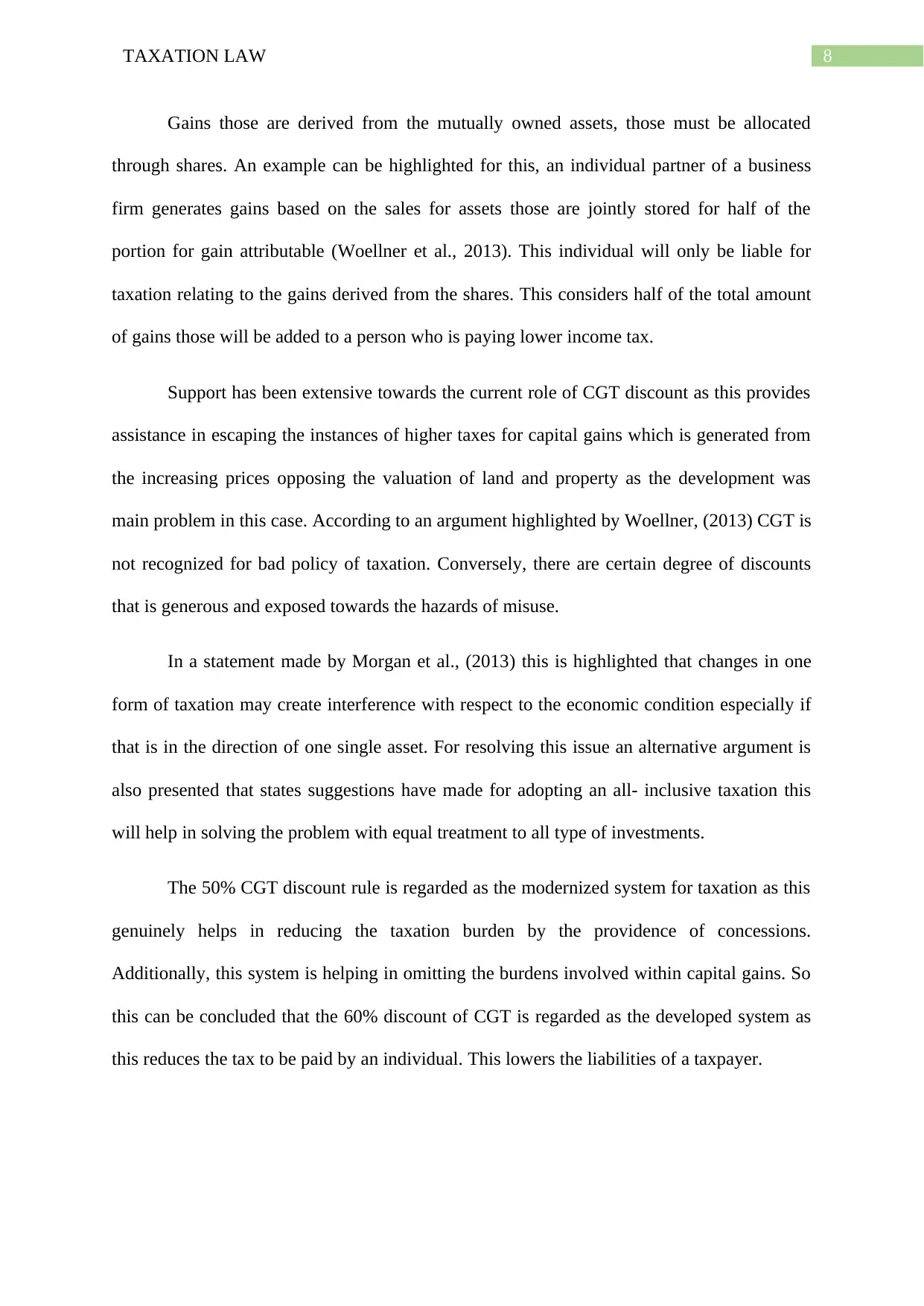
8TAXATION LAW
Gains those are derived from the mutually owned assets, those must be allocated
through shares. An example can be highlighted for this, an individual partner of a business
firm generates gains based on the sales for assets those are jointly stored for half of the
portion for gain attributable (Woellner et al., 2013). This individual will only be liable for
taxation relating to the gains derived from the shares. This considers half of the total amount
of gains those will be added to a person who is paying lower income tax.
Support has been extensive towards the current role of CGT discount as this provides
assistance in escaping the instances of higher taxes for capital gains which is generated from
the increasing prices opposing the valuation of land and property as the development was
main problem in this case. According to an argument highlighted by Woellner, (2013) CGT is
not recognized for bad policy of taxation. Conversely, there are certain degree of discounts
that is generous and exposed towards the hazards of misuse.
In a statement made by Morgan et al., (2013) this is highlighted that changes in one
form of taxation may create interference with respect to the economic condition especially if
that is in the direction of one single asset. For resolving this issue an alternative argument is
also presented that states suggestions have made for adopting an all- inclusive taxation this
will help in solving the problem with equal treatment to all type of investments.
The 50% CGT discount rule is regarded as the modernized system for taxation as this
genuinely helps in reducing the taxation burden by the providence of concessions.
Additionally, this system is helping in omitting the burdens involved within capital gains. So
this can be concluded that the 60% discount of CGT is regarded as the developed system as
this reduces the tax to be paid by an individual. This lowers the liabilities of a taxpayer.
Gains those are derived from the mutually owned assets, those must be allocated
through shares. An example can be highlighted for this, an individual partner of a business
firm generates gains based on the sales for assets those are jointly stored for half of the
portion for gain attributable (Woellner et al., 2013). This individual will only be liable for
taxation relating to the gains derived from the shares. This considers half of the total amount
of gains those will be added to a person who is paying lower income tax.
Support has been extensive towards the current role of CGT discount as this provides
assistance in escaping the instances of higher taxes for capital gains which is generated from
the increasing prices opposing the valuation of land and property as the development was
main problem in this case. According to an argument highlighted by Woellner, (2013) CGT is
not recognized for bad policy of taxation. Conversely, there are certain degree of discounts
that is generous and exposed towards the hazards of misuse.
In a statement made by Morgan et al., (2013) this is highlighted that changes in one
form of taxation may create interference with respect to the economic condition especially if
that is in the direction of one single asset. For resolving this issue an alternative argument is
also presented that states suggestions have made for adopting an all- inclusive taxation this
will help in solving the problem with equal treatment to all type of investments.
The 50% CGT discount rule is regarded as the modernized system for taxation as this
genuinely helps in reducing the taxation burden by the providence of concessions.
Additionally, this system is helping in omitting the burdens involved within capital gains. So
this can be concluded that the 60% discount of CGT is regarded as the developed system as
this reduces the tax to be paid by an individual. This lowers the liabilities of a taxpayer.
⊘ This is a preview!⊘
Do you want full access?
Subscribe today to unlock all pages.

Trusted by 1+ million students worldwide
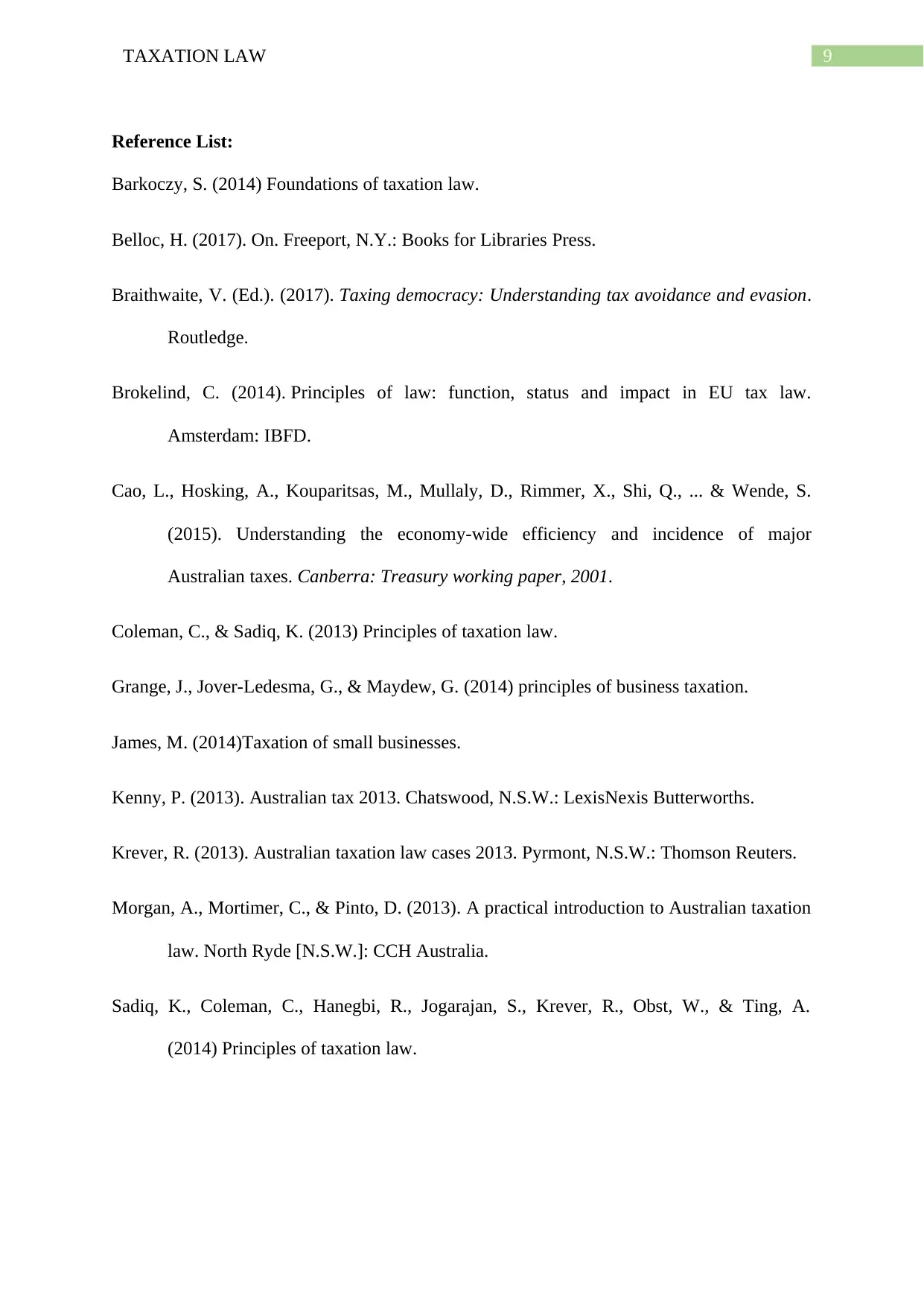
9TAXATION LAW
Reference List:
Barkoczy, S. (2014) Foundations of taxation law.
Belloc, H. (2017). On. Freeport, N.Y.: Books for Libraries Press.
Braithwaite, V. (Ed.). (2017). Taxing democracy: Understanding tax avoidance and evasion.
Routledge.
Brokelind, C. (2014). Principles of law: function, status and impact in EU tax law.
Amsterdam: IBFD.
Cao, L., Hosking, A., Kouparitsas, M., Mullaly, D., Rimmer, X., Shi, Q., ... & Wende, S.
(2015). Understanding the economy-wide efficiency and incidence of major
Australian taxes. Canberra: Treasury working paper, 2001.
Coleman, C., & Sadiq, K. (2013) Principles of taxation law.
Grange, J., Jover-Ledesma, G., & Maydew, G. (2014) principles of business taxation.
James, M. (2014)Taxation of small businesses.
Kenny, P. (2013). Australian tax 2013. Chatswood, N.S.W.: LexisNexis Butterworths.
Krever, R. (2013). Australian taxation law cases 2013. Pyrmont, N.S.W.: Thomson Reuters.
Morgan, A., Mortimer, C., & Pinto, D. (2013). A practical introduction to Australian taxation
law. North Ryde [N.S.W.]: CCH Australia.
Sadiq, K., Coleman, C., Hanegbi, R., Jogarajan, S., Krever, R., Obst, W., & Ting, A.
(2014) Principles of taxation law.
Reference List:
Barkoczy, S. (2014) Foundations of taxation law.
Belloc, H. (2017). On. Freeport, N.Y.: Books for Libraries Press.
Braithwaite, V. (Ed.). (2017). Taxing democracy: Understanding tax avoidance and evasion.
Routledge.
Brokelind, C. (2014). Principles of law: function, status and impact in EU tax law.
Amsterdam: IBFD.
Cao, L., Hosking, A., Kouparitsas, M., Mullaly, D., Rimmer, X., Shi, Q., ... & Wende, S.
(2015). Understanding the economy-wide efficiency and incidence of major
Australian taxes. Canberra: Treasury working paper, 2001.
Coleman, C., & Sadiq, K. (2013) Principles of taxation law.
Grange, J., Jover-Ledesma, G., & Maydew, G. (2014) principles of business taxation.
James, M. (2014)Taxation of small businesses.
Kenny, P. (2013). Australian tax 2013. Chatswood, N.S.W.: LexisNexis Butterworths.
Krever, R. (2013). Australian taxation law cases 2013. Pyrmont, N.S.W.: Thomson Reuters.
Morgan, A., Mortimer, C., & Pinto, D. (2013). A practical introduction to Australian taxation
law. North Ryde [N.S.W.]: CCH Australia.
Sadiq, K., Coleman, C., Hanegbi, R., Jogarajan, S., Krever, R., Obst, W., & Ting, A.
(2014) Principles of taxation law.
Paraphrase This Document
Need a fresh take? Get an instant paraphrase of this document with our AI Paraphraser
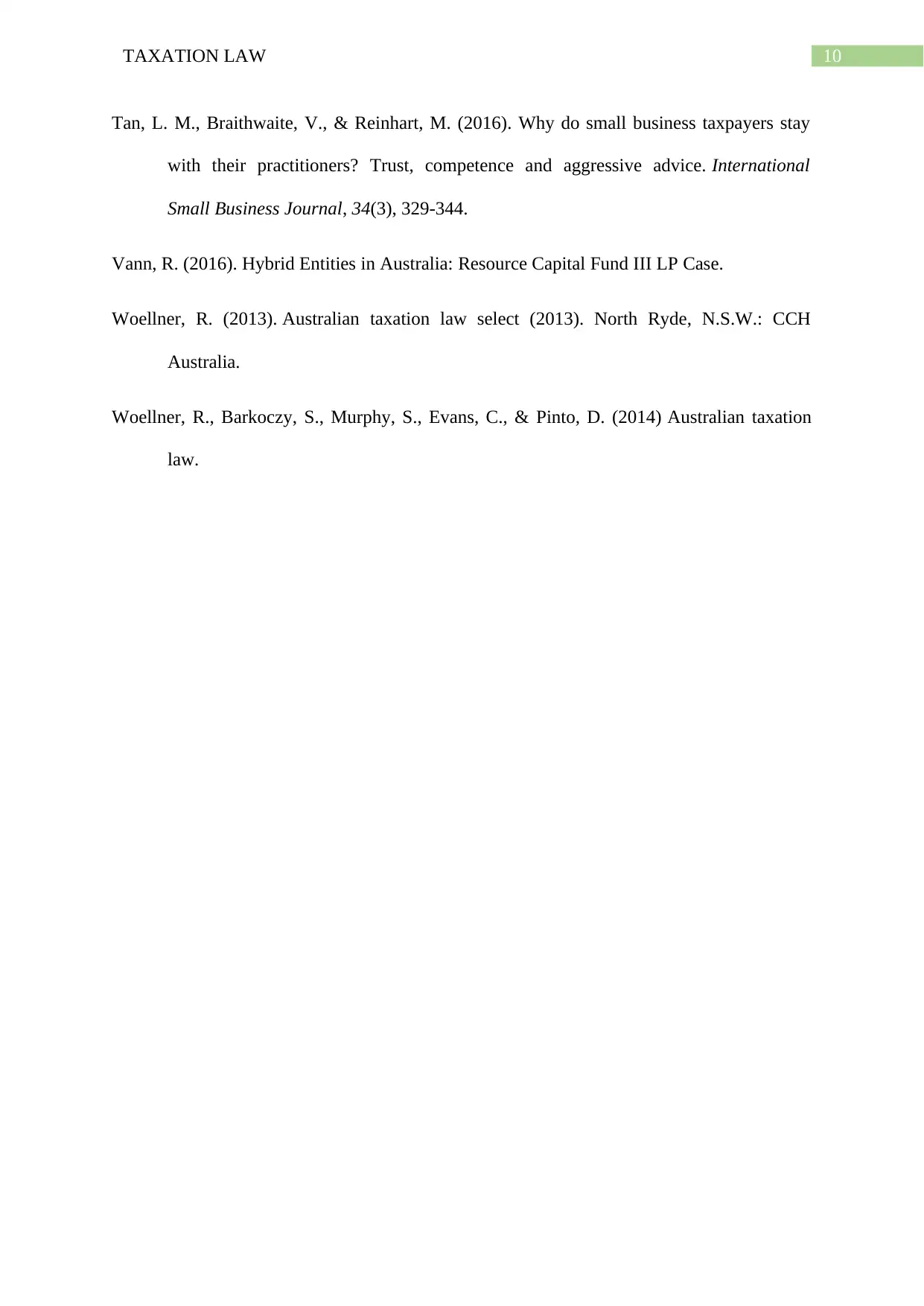
10TAXATION LAW
Tan, L. M., Braithwaite, V., & Reinhart, M. (2016). Why do small business taxpayers stay
with their practitioners? Trust, competence and aggressive advice. International
Small Business Journal, 34(3), 329-344.
Vann, R. (2016). Hybrid Entities in Australia: Resource Capital Fund III LP Case.
Woellner, R. (2013). Australian taxation law select (2013). North Ryde, N.S.W.: CCH
Australia.
Woellner, R., Barkoczy, S., Murphy, S., Evans, C., & Pinto, D. (2014) Australian taxation
law.
Tan, L. M., Braithwaite, V., & Reinhart, M. (2016). Why do small business taxpayers stay
with their practitioners? Trust, competence and aggressive advice. International
Small Business Journal, 34(3), 329-344.
Vann, R. (2016). Hybrid Entities in Australia: Resource Capital Fund III LP Case.
Woellner, R. (2013). Australian taxation law select (2013). North Ryde, N.S.W.: CCH
Australia.
Woellner, R., Barkoczy, S., Murphy, S., Evans, C., & Pinto, D. (2014) Australian taxation
law.
1 out of 11
Related Documents
Your All-in-One AI-Powered Toolkit for Academic Success.
+13062052269
info@desklib.com
Available 24*7 on WhatsApp / Email
![[object Object]](/_next/static/media/star-bottom.7253800d.svg)
Unlock your academic potential
Copyright © 2020–2026 A2Z Services. All Rights Reserved. Developed and managed by ZUCOL.



